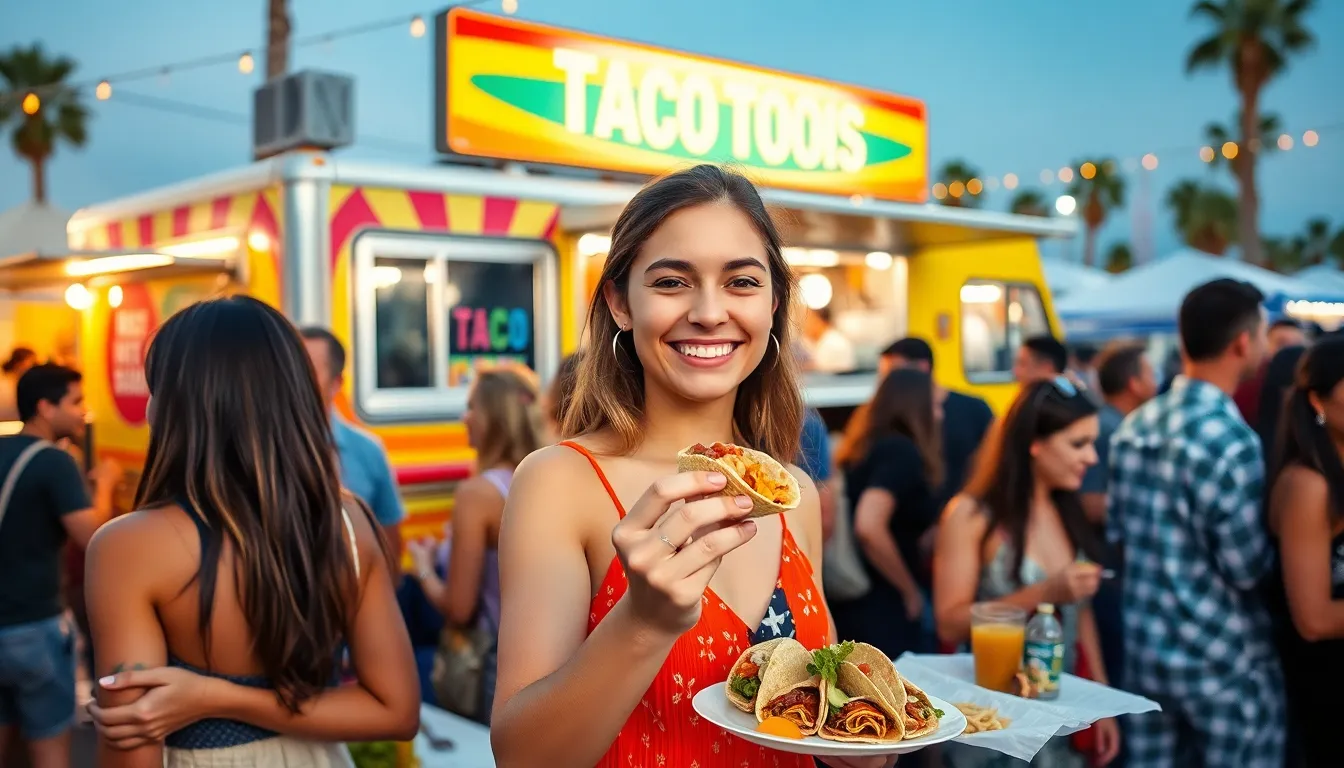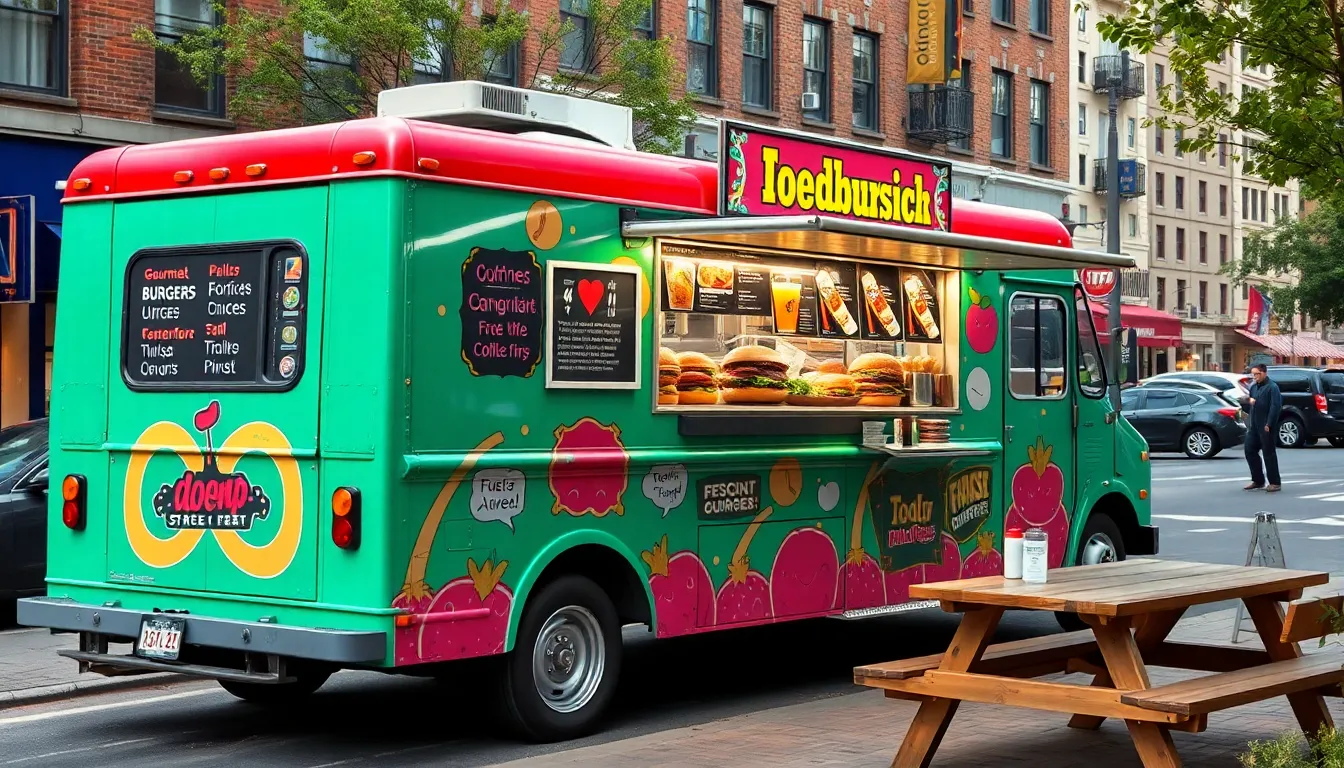Exploring World Food Trucks: A Culinary Adventure of Global Flavors and Community

Food trucks have transformed the culinary landscape, bringing diverse flavors and unique dishes to streets around the globe. From bustling city centers to quiet neighborhoods, these mobile kitchens serve up everything from gourmet burgers to exotic street food. They’ve become a cultural phenomenon, showcasing local ingredients and culinary creativity in a way that traditional restaurants often can’t.
As the food truck movement gains momentum, it’s not just about convenience or affordability. It’s a celebration of culinary innovation and community spirit. Food trucks create vibrant social spaces where people gather to enjoy delicious meals and discover new tastes. Join the journey through the world of food trucks, where every stop offers a new adventure for the palate.
World Food Trucks
World food trucks serve as vital components of the global culinary scene, showcasing a wide array of international cuisines. Offering dishes that range from gourmet burgers to ethnic specialties, food trucks create a fusion of flavors in urban landscapes. These mobile kitchens not only provide convenience but also enhance accessibility to diverse foods, making global culinary experiences more attainable.
Food trucks often emphasize local ingredients and sustainable practices, reflecting regional food trends. They frequently adapt to cultural influences, which results in unique interpretations of traditional recipes. This adaptability allows food trucks to remain relevant in ever-changing culinary markets.
Cities around the world embrace food trucks as part of their unique food culture. For example, in Los Angeles, gourmet trucks feature Asian-fusion dishes, while New York food trucks focus on classic street food items like hot dogs and pretzels. Additionally, in Mexico City, food trucks serve authentic tacos and tortas, contributing to the rich local dining landscape.
Food trucks also foster a sense of community by bringing people together in shared dining experiences. They often operate at festivals, markets, and street fairs, where they create vibrant social environments. This mingling of diverse patrons elevates the food culture, making food trucks a celebrated aspect of local culinary scenes.
Popular Food Truck Trends

Food trucks continuously evolve, reflecting culinary creativity and consumer preferences. Key trends such as gourmet street food and fusion cuisine dominate the food truck scene.
Gourmet Street Food
Gourmet street food transforms traditional concepts by elevating ingredients and presentation. Food trucks specialize in artisanal items like handcrafted burgers, gourmet tacos, and upscale desserts. Many use organic or locally sourced ingredients to enhance flavor profiles. This shift helps create unique dining experiences that match those found in high-end restaurants while maintaining the casual essence of food trucks.
Fusion Cuisine
Fusion cuisine combines elements from different culinary traditions to create innovative dishes. Food trucks excel at blending flavors, such as Korean BBQ tacos and sushi burritos. Chefs experiment with ingredients and techniques, appealing to adventurous eaters. This trend not only reflects global influences but also encourages creativity, resulting in dishes that entice a diverse clientele and push the boundaries of traditional cooking.
Top Cities for Food Trucks
Food trucks thrive in various cities worldwide, each presenting its unique cultural flair and culinary offerings. A few cities stand out for their vibrant food truck scenes.
Food Truck Culture in Los Angeles
Los Angeles boasts a dynamic food truck culture known for its diversity and innovation. The city features a wide range of culinary options, from gourmet tacos to fusion cuisine, reflecting its multicultural population. Food trucks frequently participate in events like “First Fridays” and local festivals, enhancing the community experience. Notable food trucks, such as Kogi BBQ and Guerrilla Tacos, illustrate the trend of blending traditional recipes with modern techniques. Street food enthusiasts appreciate the ability to discover new flavors and experiences throughout neighborhoods, making LA a premier destination for food truck aficionados.
Culinary Scene in Portland
Portland’s culinary scene embraces food trucks as a cornerstone of its food culture. With over 600 food trucks operating within the city, these mobile kitchens contribute to a diverse palette of choices, featuring everything from vegan dishes to artisanal comfort food. Pod locations, like the popular food cart parks, provide communal dining experiences where visitors can sample various cuisines in one setting. Portland’s focus on local and sustainable ingredients shapes many food truck menus, attracting food lovers passionate about eco-friendly practices. The city’s embrace of food trucks fosters creativity, leading to unique culinary offerings that keep locals and tourists returning for more.
Benefits of Food Trucks
Food trucks offer numerous advantages that enhance the culinary landscape and community experience.
-
- Accessibility: Food trucks provide convenient access to diverse cuisine options in various locations, often in neighborhoods lacking dining choices.
-
- Affordability: Meals from food trucks typically cost less than traditional restaurants, making flavorful dishes accessible for different budgets.
-
- Culinary Exploration: Food trucks encourage the discovery of new flavors and culinary traditions, introducing consumers to unique dishes from around the world.
-
- Support for Local Economies: Operating food trucks generates employment opportunities and supports local farmers and suppliers through the use of regional ingredients.
-
- Community Building: Food trucks create social interaction by attracting crowds at events, markets, and street fairs, fostering connections among food lovers.
-
- Sustainability: Many food trucks prioritize eco-friendly practices, such as sourcing local ingredients and utilizing energy-efficient equipment, contributing to sustainable food movements.
-
- Flexibility and Innovation: The mobile nature of food trucks permits owners to test new concepts and adapt menus to consumer demands quickly, enhancing their culinary offerings.
-
- Cultural Representation: Food trucks often reflect the cultural diversity of their areas, allowing culinary narratives and heritage to be shared through food.
Each of these benefits showcases how food trucks play an essential role in enhancing food culture and community engagement in urban settings and beyond.
How to Start Your Own Food Truck
Starting a food truck involves several key steps to ensure success. Planning plays a crucial role. It includes defining a unique concept, selecting a target market, and creating a business plan. This plan outlines operational strategies, financial projections, and marketing approaches.
Legal requirements require attention. Entrepreneurs must obtain permits and licenses specific to their city. These may include health department permits, food handler’s permits, and business licenses. Compliance with local food safety training regulations is essential.
Vehicle acquisition follows. Owners can buy or lease a food truck. Considerations should include size, layout, and equipment necessary for the type of cuisine offered. It’s important to choose a vehicle that allows efficient food preparation and service.
Menu development holds significant importance. A well-curated menu focuses on a few signature dishes that stand out. Seasonal ingredients can enhance flavors and attract customers. Incorporating local trends into the menu often elevates the food truck’s appeal.
Marketing strategies help establish brand presence. Social media platforms serve as effective tools for promotion. Engaging content and sharing behind-the-scenes glimpses can connect with potential customers. Participating in local events and festivals provides exposure and builds community relationships.
Budgeting for expenses is critical. Start-up costs may include equipment, permits, ingredients, and labor. A realistic financial plan ensures sustainability and profitability in the early stages of operation.
Networking within the food truck community fosters support and idea exchange. Joining local associations and attending industry events provides opportunities to learn and grow. Collaborating with other food trucks can enhance visibility and attract a broader audience.
Adaptability remains key. The food truck industry fluctuates based on consumer preferences and market trends. Staying informed about food trends and customer feedback allows for adjustments that keep the business relevant and appealing.
Conclusion
Food trucks are reshaping the culinary landscape by offering diverse flavors and fostering community connections. They not only provide convenient dining options but also create vibrant social spaces where people can explore new tastes and cultures. As cities worldwide embrace this mobile dining phenomenon, the significance of food trucks continues to grow.
Their ability to adapt to local ingredients and sustainability practices enhances their appeal, making them a vital part of urban food culture. Whether through gourmet offerings or innovative fusion dishes, food trucks invite adventurous eaters to experience a world of culinary creativity. As they thrive in various communities, food trucks will undoubtedly remain a cherished aspect of the global food scene.




